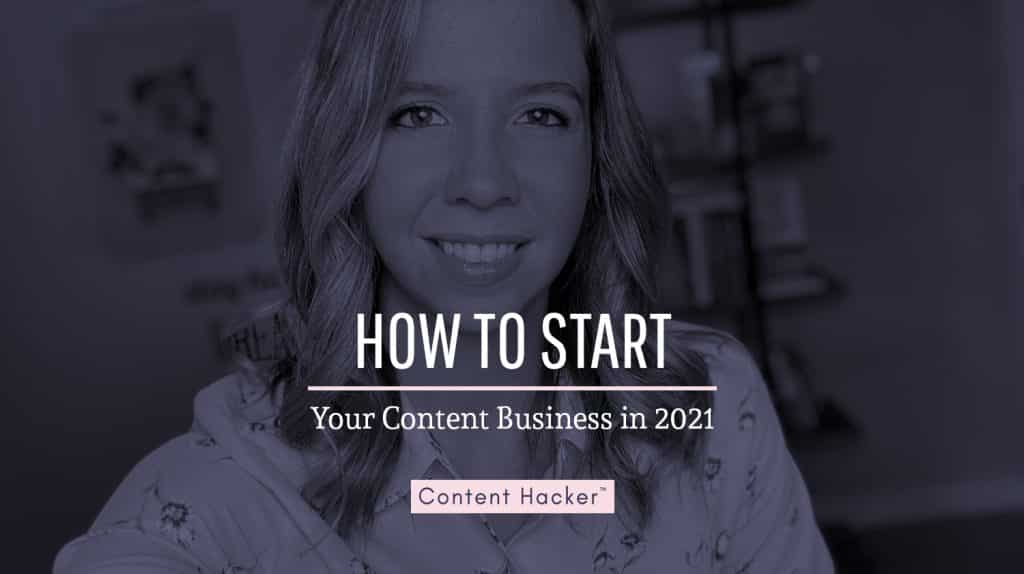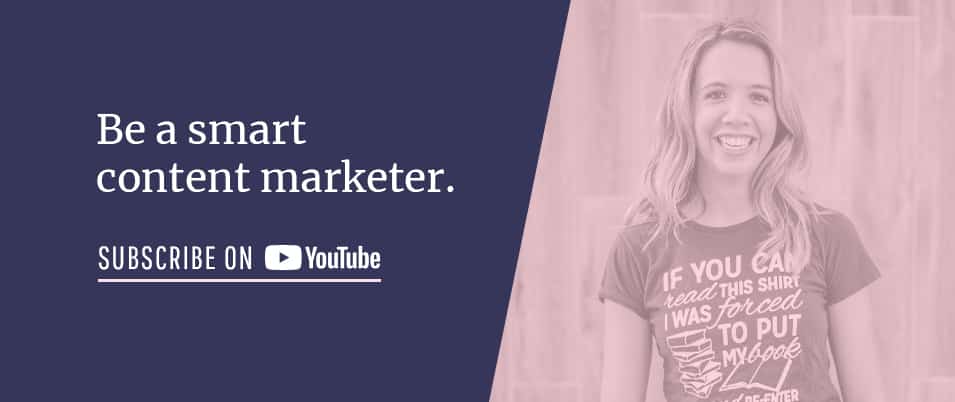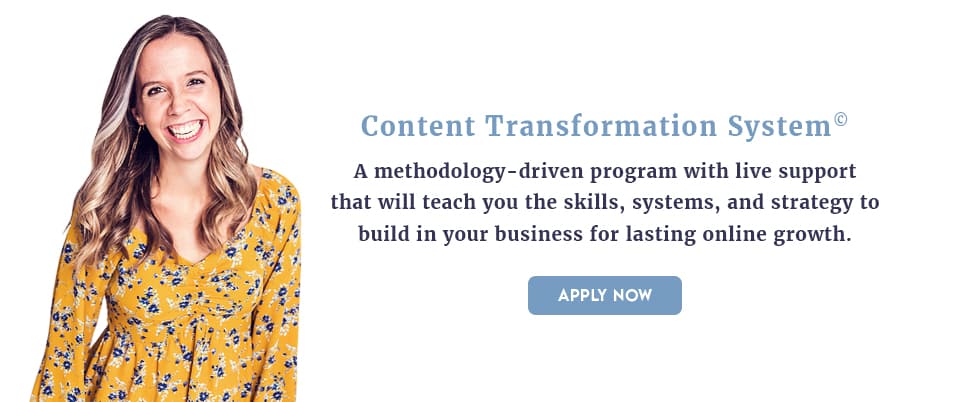Hopeful entrepreneurs start around 543,000 businesses every month. According to the U.S. Bureau of Labor Statistics, only about half of them will make it to the five-year mark. ?
Have you ever wondered what sets the successful ones apart from the other half?
(No, it’s not some secret sauce that makes their social media posts suddenly go viral.)
In this video, I explore what it takes to start a content business in 2021. From the level of commitment to the opportunities out there, get ready for some real talk, practical advice, and hard-earned wisdom gleaned from surviving a decade in business.
This Is the Only Bulletproof Way to Start a Content Business in 2021
Have you ever wondered why most axioms about success seem to reference roads?
That’s because success isn’t the result of a single action. There’s no quick hack to growing a multi-million-dollar business (though it’d be nice if they came in little packets where you could just add water!).
To succeed, you don’t need to figure out what to do to go viral or spot the next big fad before the competition. Instead, you must identify a pathway that you can take to get there over time.
In my book, Skip the Degree, Save the Tuition, I outline the one that I teach my students. It’s the only pathway that I’ve found that produces lasting success in a digital career. I call it the 4Ls, and it goes like this:
- Love. Unearth your passion and purpose. Find the work that drives you.
- Learn. Educate yourself about everything you can on your chosen topic.
- Labor. Put in the fieldwork to gain experience and practical knowledge.
- Level Up. Own your expertise and unlock the professional that you are.
The beauty of it is that no matter where you are in your career, you can start to follow it right away.
Now, following this pathway can – and will – look different with each person. I can’t tell you exactly what decisions to make these will depend on your unique passion and purpose. I’m not going to try, either.
I can share with you the hard-won pointers that I’ve learned by following those four steps so that you don’t trip into any pitfalls along the way.
If you’re ready to start your content business in 2021, this is what you should know.
In my free video training, I lay out the full pathway to starting your business successfully, without burnout. Watch now.
9 Pro-Tips to Maximize Success in Your (Digital) Career
If you’re thinking about getting into content, now’s the perfect time. The content marketing industry is literally exploding, and the internet is playing an even more prominent role in business than ever before.
But before you run off to start that content business, here are a few things to keep in mind:
1. Bridge Opportunity and Passion with Real Skills
It seems like there are two pieces of conflicting advice out there when it comes to choosing a career or life purpose:
Without getting into the merits of each, I’m going to tell you to do both.
Passion is important because it will keep you driven. Opportunity means you’ll actually have a chance at paying your bills.
First, figure out what you love to do. Then, identify what skills you need to take advantage of the real opportunities that exist. For example, if you’re a writer (passion) who wants to get into the content industry (opportunity), then the skill set you develop might look like this:
- SEO writing
- Copywriting
- Content strategy
- Long-form content writing
- Digital marketing
(Psst – in need of more ideas? Read Skip the Degree and get 50+ more skills you can learn!)
2. Become a Practitioner Before Starting a Business
Do you know the top reason why startups fail? According to CB Insights, 42 percent of failed startups indicated they found no market need.
In other words, they created a product that nobody wanted.
That’s one of the dangers when you simply get a team together and go into business.
Fortunately, you can sidestep that by becoming a practitioner in your field first. That means going out, getting clients of your own and learning what it takes to create great content.
Once you go into business, you’ll find that things become so much easier. That’s because you’ll:
- Know what the final deliverables should look like.
- Have the ability to step in at any point in your business to help make things work.
- Understand how to sell your service or products.
- Be able to identify new hires who know what they’re doing.
3. Find Mentors
Mentors are an age-old recommendation to accelerate learning that’s well-regarded in business. Yet, it’s a tool that’s routinely under-utilized. In one study of 3,000 people, 76 percent of respondents agreed that mentors were important. Yet only 37 percent of people currently had one.
I highly recommend you find a mentor. Identify who’s a voice of authority in your industry and take them on as a role model. These are my three:
- Jon Morrow at Smart Blogger.
- Joe Pulizzi at Content Marketing Institute.
- Kimanzi Constable at Results Global Impact.
Want me to be your mentor as you build your brand into a sustainable success? That’s exactly what my mentorship program, The Content Transformation System, is for.
If you need someone who’s been in the trenches, who can teach you how to leverage great content to build your business — which I did, by the way, to the tune of seven-figures — I’d love to be your guide. Apply today for The Content Transformation System. ❤
4. Your Development Is Not An Expense
I may have written a book called Skip the Degree, but that doesn’t mean I don’t advocate paid training. (I’ve invested over $8,000 into my own in the past six months.)
In contrast, don’t be shy about investing in paid courses, seminars, workshops, or anything else from your mentors or other industry leaders. Small doses of the right training can accelerate your career much faster than any degree that takes years to complete.
Your professional development is not an expense. It’s an investment that pays dividends in the long run.
Of course, not all courses are created equal or of equal use to everyone. When considering whether or not to invest in a course, ask yourself:
- Will it help me move forward? Is this a hard or soft skill I need to be successful at [x]?
- Are they credible? Is the instructor someone who’s known and respected in my field?
- Do they have proof? Does the instructor have their own business that proves their teachings work, or does their business seem to be simply teaching certain skills?
If the answer is yes to all three, figure out how to make it happen!
5. There Are Many Ways Up the Mountain
If there’s one thing to know about the 4 Ls pathway, it’s that it’s very open-ended. Just like every business is unique, every person’s professional development takes different routes.
While you’re devouring everything you can, you’ll come across a lot of people who try to tell you what success looks like or what you need to have accomplished by a certain date and time.
Don’t listen to them. Remember:
- It’s okay to be a team of one. Before there was Express Writers, there was Express Writer. I was Julia McCoy, content writer for hire. In today’s digital world, it’s completely possible to get paid well and enjoy a rewarding career without ever scaling up.
- It’s okay to decide something isn’t for you. As you transition into a writing career, you may discover you hate being self-employed. You don’t have to be. As of April 2021, there are over 52,000 content marketing jobs listed on Indeed.
- It’s okay to take things in a completely different direction. You may stumble on a niche or a way to apply your writing skills in a totally novel way. (See what I did there?)
Bottom line: Keep your eyes on your overarching goal. Focus on learning and applying lessons, and the next step will always be clear.
6. Make Your Reputation Your Foundation
Once you’ve learned a lot, it’s time to get your hands dirty with getting good at your craft. When you’ve hit a point where you feel restless or like you see a way to make things work, it’s time to bust out that labor.
I shared some ways to land your first clients, but as you do, remember one thing: It’s not about the money.
In fact, at first, it shouldn’t be. At first, you’ll focus on building your ladder – landing small clients and working your way to big ones.
In the process, build your reputation and make it the foundation of all you do. That means:
- Develop your work ethic. You’d be surprised how many freelancers I’ve met who aren’t willing to actually show up and put in the work.
- Learn to take responsibility for your deliverables. You deserve to celebrate your successes and learn from your failure. Cultivating a habit of integrity will make you a better business owner down the road, if you go that way.
- Network. Encourage referrals and recommendations from clients, but also be willing to connect with other freelancers in your field.
Your goal? To one day have clients, partners, and other thought leaders remember your name.
7. Create Processes
Once you begin to level up and scale, you’re going to find that keeping everything straight gets trickier.
My advice? Create processes.
Any time you have an operation or a way of doing things that needs to be replicated across your business, write it down. It doesn’t have to be fancy, but it should be detailed.
Documented processes help:
- Create a more uniform client experience.
- Keep the whole team on the same page.
- Provide performance metrics for writers, editors, and other staff.
- Train new hires.
- Make the business run even when you aren’t there.
8. Hire People Who Can Become Partners
Here’s a little secret from the trenches of business: Finding the right people is hard. However, getting the wrong people is dangerous. CB Insights surveyed startups and 23% of them reported having the wrong team at the helm.
Fortunately, a few strategies exist to help find the right people for your business:
- Look for people who can become partners. These tend to be disciplined, competent, self-motivated individuals who don’t mind making decisions on their own and can get things done.
- Emphasize culture fit before experience. Skills can be learned, but not every personality or soft skillset will gel with your brand.
- Ensure the alignment of personal and organizational motivations. Is this person committed to the common mission or more interested in using you as a stepping stone? It doesn’t matter how skilled they are if they aren’t interested in wholeheartedly joining your team.
9. Give Yourself 2-3 Years at First
Last but not least, remember that success requires consistent effort over time. The 4 Ls are not a get-rich-quick pathway. They won’t help you go viral overnight. In fact, it’s not uncommon for people to get bored after six months and move on to something else.
If that’s you, don’t try to start a content business. It will take time to get the right team, tools, and processes in place to make your dream work.
James Altucher says that reinventing yourself (and becoming profitable) takes about five years. However, by year three, you’ll likely be in a place where you’re making money.
Bottom Line: Choose Mastery Over FOMO and Fads
If you want to start your content business, there’s no better time than right now. The internet isn’t going anywhere. With the content market industry expected to grow another $269 billion in the next few years, there’s plenty of opportunities out there to seize the dream career you’ve always wanted.
I took a close look at exactly what pursuing that dream entails and shared some of my best tips for growing success in the long run. You won’t find any quick and dirty hacks here, and no promises of overnight success.
All you need is to love what you do, learn everything you can, be unafraid of labor, and level up strategically to enjoy sustainable, lasting success.
Finally, learn the skills, systems, and strategies that support long-term success, not short-term viral popularity. My mentorship program, The Content Transformation System, shows you the special sauce you need to make it happen. Let me and my team of expert coaches guide you as we build your brand better than ever — together.








